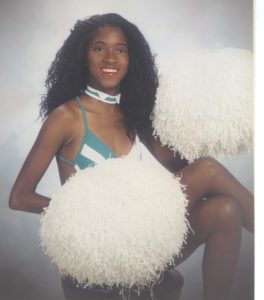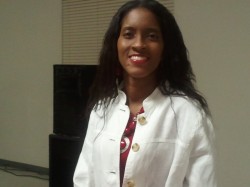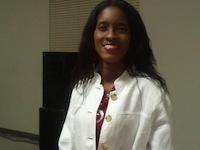 Greetings, all! Bart here. Please welcome Felecia, another wicked-smart Science Cheerleader with a doctorate and a mission. Read on, and learn about her work in the field of clinical psychology!
Greetings, all! Bart here. Please welcome Felecia, another wicked-smart Science Cheerleader with a doctorate and a mission. Read on, and learn about her work in the field of clinical psychology!
What got you interested in science?
Felecia: One of my middle school science teachers planted the seed for my love for science. He made science FUN. My AP high school science teacher brought science to life through interactive activities and took the intimidation out of complicated processes. I worked throughout high school and summers in college in a microbiology immunology lab at UM [University of Miami]. It was here that my love of research was developed. I came to learn how theories were developed and investigated their real-world applicability.
You’ve got a Master’s and Ph.D. in Clinical Psychology. What interested you in that field?
Felecia: I originally wanted to go to medical school, but after I passed out during a dissection in my anatomy course I realized my stomach was too weak! On a brighter note this led me to finding my true passion, psychology. While taking undergraduate courses I often noticed that certain issues seemed to impact minorities disproportionately and there also appeared to be little research into cultural differences. I decided to go to graduate school and pursue a doctorate so that I could not only try and add to the research database but also be a clinical provider to underserved populations.
When you contacted us, you said you worked in several aspects of psychology, including addictions, childhood disorders, gerontology (dealing with the elderly), and diversity issues. That’s a broad set of interests, a lot of them very difficult for the people involved. What helps you work with people in pain?
Felecia: My love of the field helps me to get up every day and go to work. If you don’t have a passion for what you do it will show through not only to your patients/clients but also to your colleagues around you. When I get a simple thank you, that is enough and it energizes me to continue forward even when I have very challenging cases.
In addition to all your other interests, you also write articles on parenting. What would you advise parents of budding science cheerleaders?
Felecia: Dancing was an outlet for me. My parents allowed me to take up gymnastics and dance but only if my grades were excellent. It is important for children to have extracurricular activities but academics must come first. Having both allows both sides of the brain to develop and it helps develop teamwork, presentation, and leadership skills. These are important skills that they can also be used outside of cheerleading.
 Favorite and/or least favorite courses you took to prepare for your degrees?
Favorite and/or least favorite courses you took to prepare for your degrees?
Felecia: I particularly enjoyed abnormal psychology and my assessment courses. These were my favorites because I could clearly see their real-world applicability. As part of my doctorate program we also had to take five statistics courses. They were challenging and I had to study hard to get through them. I am not sure why I have never been able to fully master statistics. I guess everyone has that subject area that is challenging.
You cheered for the Miami Dolphins. Why did you decide to try out to be a professional cheerleader?
Felecia: I was on the dance team in both high school and college. I wanted to give myself a bigger challenge so I tried out the summer before my college senior year with over five hundred other women.
What’s a typical day like in your field?
Felecia: My responsibilities are pretty much the same each day. I may have to perform a psychological evaluation on any new admissions and see my patients for individual and family counseling. I also attend any care plan meetings with my patients, their family, and clinical staff to discuss treatment.
Best part of your day job?
Felecia: The best part of my job is when we are able to discharge a patient back home to their family once they are stable.
Do you find that stereotypes about cheerleaders helped or hindered your professional experiences?
Felecia: I haven’t cheered in a very long time so most people don’t know I was once a professional cheerleader. When coworkers find out they are often very surprised because most people see them as being mutually exclusive. Unfortunately society still has a preconceived notion about cheerleaders being pretty, but not smart and scientists being nerdy, uncoordinated, and unattractive.
How did your fellow cheerleaders accept your interest in science?
Felecia: The majority of current and former cheerleaders have varied professions including entrepreneurs, teachers, nurses, engineers, lawyers, and doctors. We are all supportive of each other it is like a sisterhood so to speak.
What advice would you give your 12-year-old self?
Felecia: Follow your heart (cheerleading) AND your brain (science)!
What are your plans for the future?
Felecia: I want to write a parenting book in the next year.
Best cheerleading experience?
Felecia: My first preseason game cheering for the Miami Dolphins. It was an honor cheering under the Directorship of the late June Taylor.
Best science-related experience?
Felecia: I had designed and directed an afterschool program for special needs children and adolescents with behavioral and psychological issues. One middle school student came to my program with failing grades and numerous school suspensions for fighting peers. After a year of consistent participation and attendance in my structured program he made the academic honor roll. It was an incredible outcome for me and my staff.
What’s one thing people might find especially surprising about you?
Felecia: I have a wicked sense of humor!
If you could rewind the clock and change your degree, would you? If so, to what and why? If not, why not?
Felecia: I wouldn’t change my degree for anything. I truly enjoy my work.
Why do you want to be a Science Cheerleader?
Felecia: Looking around me professionally I see the number of students interested in STEM careers decreasing. Although we have more females and minorities in the field than when I started, fewer students are coming to the field to keep up with those that will be retiring. As a country we are outsourcing our science and technology services because we can’t find enough talent to fill the need here at home. My participation in Science Cheerleader will allow me to be a role model to encourage girls to consider going into STEM fields as a career choice.

